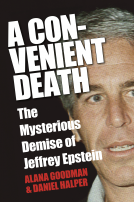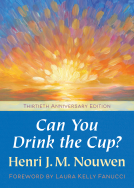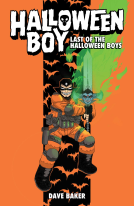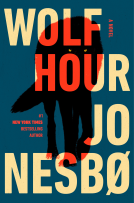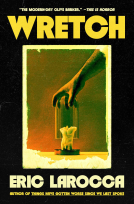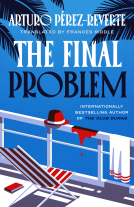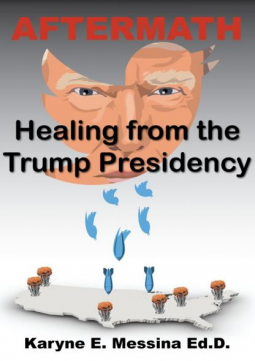
Aftermath
Healing from the Trump Presidency
by Karyne E. Messina, Ed.D
This title was previously available on NetGalley and is now archived.
Send NetGalley books directly to your Kindle or Kindle app
1
To read on a Kindle or Kindle app, please add kindle@netgalley.com as an approved email address to receive files in your Amazon account. Click here for step-by-step instructions.
2
Also find your Kindle email address within your Amazon account, and enter it here.
Pub Date Feb 01 2021 | Archive Date Mar 30 2021
Talking about this book? Use #Aftermath #NetGalley. More hashtag tips!
Description
It doesn’t take a professional to see the chaos in which we’ve become mired, but a professional can help to make sense of what has happened and what lies ahead. Aftermath: Healing from the Trump Presidency by Dr. Karyne Messina is an endeavor to contribute to the repair that is needed in our country.
From the perspective of a seasoned psychologist and psychoanalyst Dr. Karyne Messina, Trump’s behavior has encouraged the development of a generation of people inclined to hateful identity politics and bigotry, while also dismantling our country’s institutions and natural resources. To heal will take time, patience, and a willingness to take stock of our viewpoints and square them with divergent Ones.
It’s not so unusual anymore for families and friends who find themselves on opposite ends of the political spectrum to refrain from engaging in any sort of meaningful conversation for fear that such discussions will ruin already fractured relationships. It shouldn’t be that way.
Aftermath is a guide on how we can heal, with ideas on how each of us can help bridge the divide that has only grown deeper since Election Day in November 2016.
By using the knowledge and skills developed over three decades of treating patients for a wide range of psychological issues, author Dr. Karyne Messina brings hope about the clear route to healing in the aftermath of the destruction of the past four years.
Karyne Messina, Ed.D. is a licensed psychologist and board-certified psychoanalyst who has been in practice for over 30 years. Dr. Messina has worked with children, adolescents, and adults with a variety of mental health diagnoses as well as various learning issues. Aftermath is Dr. Messina’s second book.
Advance Praise
From a college in the field of psychoanalysis:
"Wow, Congratulations! A superlative synthesis, and call to action! How do you write so many pages so quickly? Incredibly impressive...Love how psychoanalysis is currently evolving! I think your conceptualization of projective identification is very apt. The relentless gaslighting and denial that Trump employs-the most primitive defenses. He has managed to project his fear of germs into the outer world, such that our entire population is having to negotiate past a paranoid schizoid position during the pandemic, the fear of another who can infect us, hand washing, wariness of the stranger. Fences in the world outside, rather than recognizing the stranger within. In the case of Trump, his living in a perverse and anal universe, corrupting institutions, without collaborative know how, an inability to empathize or contain anxiety within domestic and foreign relations.
I think about leadership within Psychoanalytic organizations, institutes, and training programs. How processes of trauma or projective identification are often transmitted from generation to generation. It takes great trust and courage for individuals to engage in psychoanalytic treatment or training, given the fact that transference, countertransference, internalizations are ubiquitous in the consulting room, in supervision, where there is often a parallel process, in the classroom, within organizations, or nation-states. I have thought a lot about the ways projective identification within a dyad or group can go awry and create impasses with regard to ethnicity, race, or even ageism, ie what we let elders or adolescents hold for us.
From a Community psychoanalytic perspective, optimally we need to be able to engage in dialogue or Radical Openness, when bringing our symbolic couches, or ideas into the community, with any complex interpretations in line with where individuals or groups might be at a given moment, addressing or translating to well functionings egos, rather than speaking past consciousness to the unconscious in the town square to pull rank fettered by theory, or denying real feelings, in ways that can be received as gaslighting and derailing. I think Muriel Bowser was immensely psychoanalytic and able to mitigate potential unrest and emotion when she boldly painted the street Black Lives Matter and named the Plaza in front of the White House prior to an anticipated rally in Washington.
I appreciate your writing on Attachment and attachment trauma, introducing "redactional identification" and the necessity for openness and empathy for repair. The courage and compassion required to be empathic. Besides Character development, shared by most of our great religious traditions, psychoanalysis adds much value with knowledge about internalization, projective identification, mentalization, and reparation. I love your thanksgiving ideas with the four R's ,"remembering, repairing, reforming and reconciling."
Available Editions
| EDITION | Ebook |
| ISBN | 9780578792385 |
| PRICE | $0.00 (USD) |
Average rating from 4 members
Featured Reviews
This is an invaluable resource in the search for how to bounce back from a Trump presidency. The author gives us ways to recover from the PTSD-like symptoms of four years of trauma, and is a n expert guide to mental and psychological recovery.
Readers who liked this book also liked:
L.M Montgomery
Children's Fiction, Comics, Graphic Novels, Manga, Teens & YA
Melissa Flores (Author), Daniel Gete (Artist)
Comics, Graphic Novels, Manga, Sci Fi & Fantasy
We Are Bookish
General Fiction (Adult), Mystery & Thrillers, Sci Fi & Fantasy
